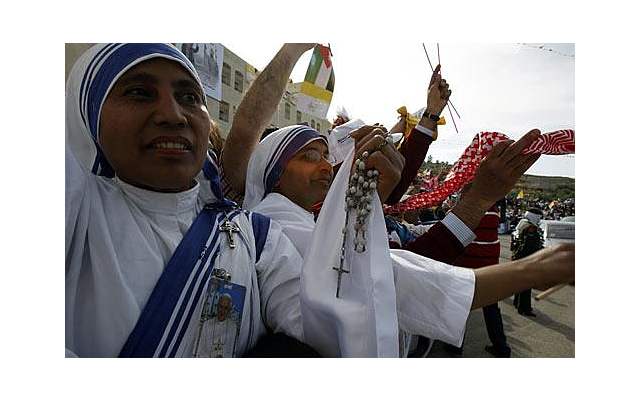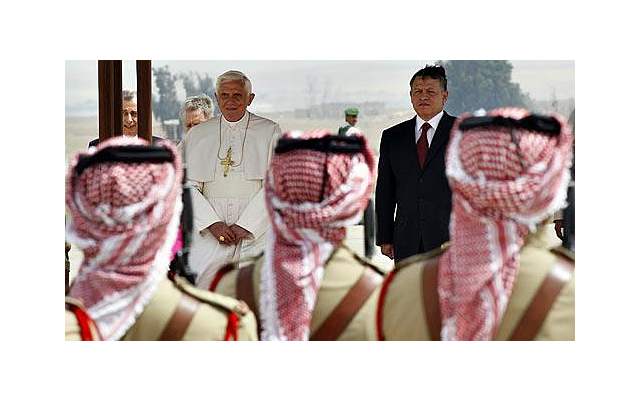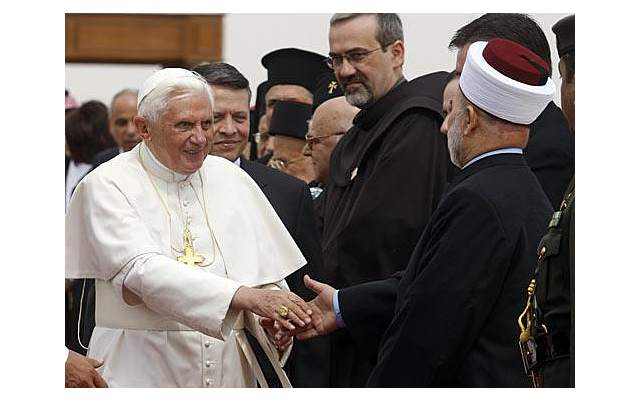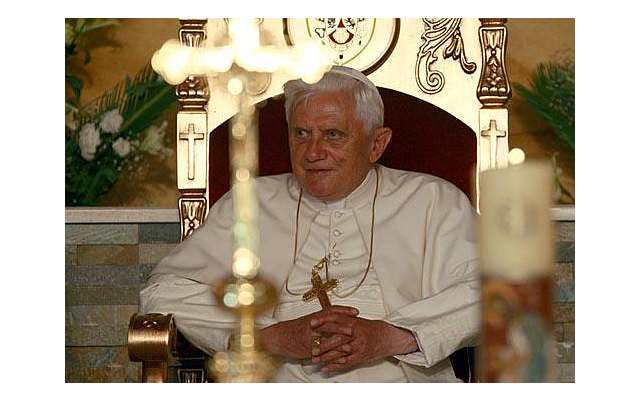Bildene (fra Vårt Land) under viser pave Benedikts første dag i Jordan, der han fikk en svært varm velkomst.




John Allen skriver at mens pave Benedikt skal være tre dager i Jordan på denne turen, var pave Johannes Paul der bare 24 timer, da han besøke Midt-Østen i år 2000. Islam er nemlig blitt mye viktigere på disse ganske få årene, av to grunner: Two epochal events have combined to propel Islam to the forefront of Catholic consciousness. In short-hand fashion, one might call them 9/11 and 9/12.
The first refers to the terrorist attacks of Sept. 11, 2001, and the terrifying prospect of a global conflict between Islam and the West they seemed to herald. The second evokes Benedict XVI’s famous speech at the University of Regensburg, delivered on Sept. 12, 2006. On that occasion, Benedict cited a Byzantine emperor to the effect that Muhammad, the founder of Islam, brought «things only evil and inhuman, such as the command to spread by the sword the faith he preached.» The speech set off a firestorm which had the paradoxical effect of both disrupting, and yet also energizing, Catholic-Muslim relations.
Benedict’s trip, therefore, isn’t a photocopy. It’s an original, the first papal voyage to the Holy Land in which attention to Islam doesn’t take a back burner to other priorities, above all the relationship with Judaism.
The pope struck a note of Christian-Muslim harmony immediately this afternoon, expressing «deep respect for the Muslim community» during a brief welcoming ceremony at Amman’s Queen Alia International Airport.
In a break with protocol, Jordan’s King Abdullah II drove out to the airport to personally welcome the pontiff. In another gesture of deference, Abdullah II delivered his remarks in English, but provided translations in both Italian and Latin, a rarity on papal travels.
Benedict XVI is the third modern pope to visit Jordan, the first being Paul VI in 1964. The Vatican has long looked to Jordan as a model of Christian-Muslim coexistence, in part because the country’s Hashemite monarchy, which claims direct descent from Muhammad, sees itself as a natural leader of Islam’s center. Jordan is also perhaps the most reliable U.S. ally in the Middle East.
Benedict also owes the Jordanians a particular debt of gratitude, since it was the Royal Aal al-Bayt Institute for Islamic Thought in Amman that spearheaded a positive 2006 response from 38 Islamic scholars after the Regensburg speech, and followed that up with an open letter in 2007 titled «A Common Word,» this one signed by 138 Muslim leaders. Both gestures are credited with getting Muslim-Christian relations back on track in the wake of Regensburg.
Today, Benedict tipped his cap to his hosts.»The opportunity that Jordan’s Catholic community enjoys to build public places of worship is a sign of this country’s respect for religion,» Benedict told Abdullah. «I want to say how much this openness is appreciated.»
Referring to Jordan’s efforts at inter-faith dialogue, Benedict said they promote «an alliance of civilizations between the West and the Muslim world, confounding the predictions of those who consider violence and conflict inevitable.»
… In his welcome, Abdullah told Benedict that Muslims and Christians must join forces against «voices of provocation:» and «ambitious ideologies of division» that «threaten unspeakable suffering.»
Jordanian Catholic Rateb Rabie, who today heads the U.S.-based Holy Land Ecumenical Foundation, said that his native country walks its talk. «It really is a moderate country,» Rabie said. «They’re not just trying to show that image to the world, but it’s who they are.»
Other local observers, however, caution against an overly idyllic view. … …
